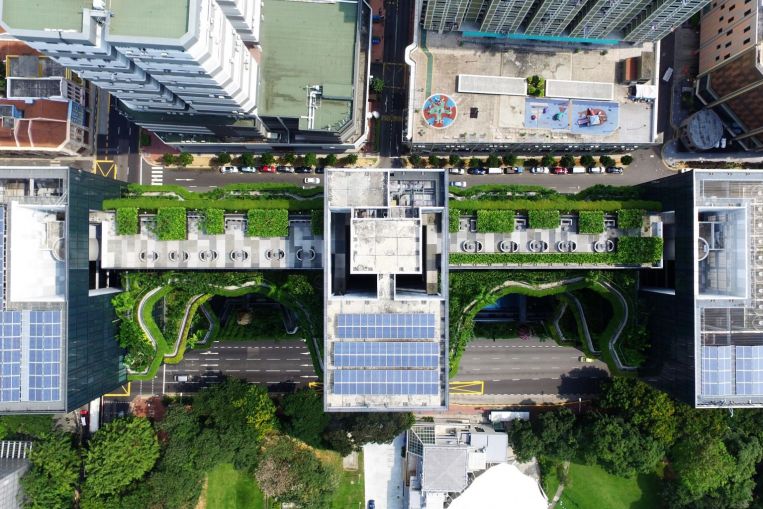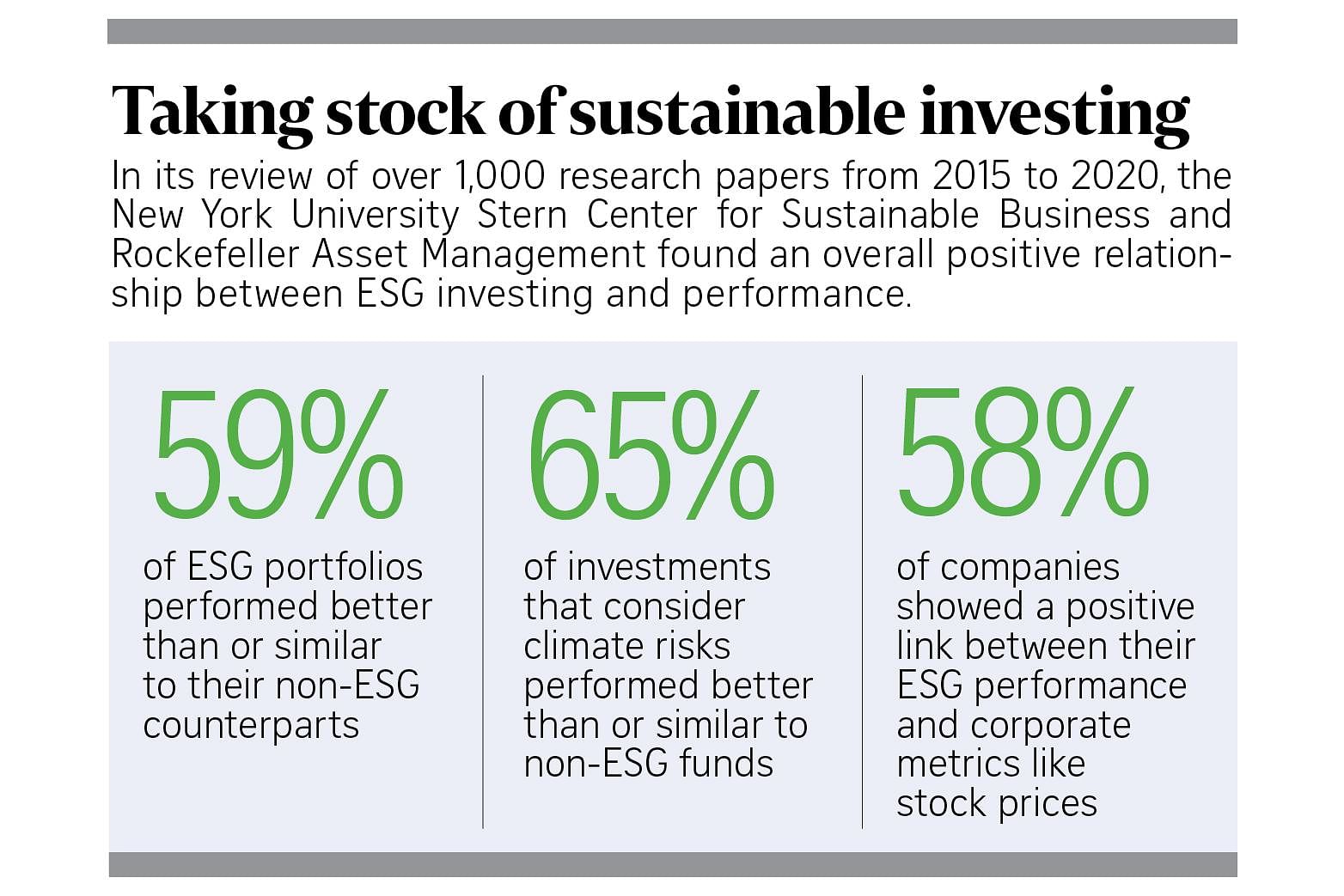More individuals and institutions today are looking to generate positive returns for themselves and the world through sustainable investing.
This approach of incorporating environmental, social and governance (ESG) factors into investment decisions, once seen as a niche strategy that trades returns for virtuosity, is now mainstream.
“While sustainability is not new, the megatrend that has emerged in recent years is sustainable investing,” says Ms Jacquelyn Tan, head of group personal financial services, UOB.
Is sustainable investing gaining ground in Singapore? UOB has seen a spike in interest across South-east Asia and locally, says Ms Tan.
Its 2021 Asean Consumer Sentiment Study found that nine in 10 Singaporeans believe sustainable investing will become more common over the next three to five years. Of those surveyed, 13 per cent already have sustainable investments within their portfolios, and 90 per cent were keen to find out more.
The bank has also experienced an increase in demand for sustainability-linked investment solutions.
Ever since UOB integrated ESG considerations into its full suite of investment solutions in October last year, assets under management for its sustainable funds have grown by almost 260 per cent. As at the end of June 2021, customers across the region invested close to S$500 million in ESG-linked solutions, Ms Tan says.
The trend that has been observed in Singapore mirrors what has been happening globally.
At the start of 2020, sustainable investments in five major markets — Europe, the US, Canada, Australasia and Japan — totalled US$35.3 trillion (S$47.7 trillion), up 15 per cent from US$30.7 trillion in 2018, says the Global Sustainability Investment Alliance (GSIA) in its most recent biennial review.
The GSIA is an organisation promoting sustainable investments through a series of regional affiliates.
In 2016, global sustainable investments stood at just US$22.8 trillion.
Why the surge in sustainable investments?
This growing appetite for investments aligned with personal values, environmental and social concerns could in part be due to more investors coming of age under the shadow of increasingly grim climate reports.
Recent extreme weather events have wreaked havoc across the world, demonstrating the urgent need for change, whether it is by switching to renewable energy or through the decarbonisation of economies and industries.
Meanwhile, heightened awareness of social issues — from global poverty and income inequality to labour welfare and diversity — is also prompting new and seasoned investors to heed how their capital is put to work.
The Covid-19 pandemic has accentuated environmental and social issues, highlighting the need for more collective action from investors, says Ms Tan.
She believes that investors are also keeping an eye on sustainable investments because of “improved regulations on ESG reporting and awareness on financial materiality, defined as the relevance of a sustainability factor to an organisation’s financial performance”.
And it seems like investors like what they see. Already, over 3,800 money managers overseeing more than US$121 trillion in assets globally are now signatories of the United Nations-supported Principles for Responsible Investment (PRI).
A global network of investors, the PRI and its six principles offer possible actions for investors to incorporate ESG issues into their practice.
Media company Bloomberg predicts that global ESG assets could exceed US$53 trillion by 2025, up from a projected US$37.8 trillion by the end of 2021.
This assumes a 15 per cent growth — just half the pace at which ESG assets have climbed over the past five years — and would mean that ESG assets could make up more than a third of the projected US$140.5 trillion total assets under management by 2025.
While Europe still accounts for half of global ESG assets, the US has seen strong expansion and may dominate the category from next year on, says Bloomberg. The next wave of growth could come from Asia, particularly from Japan.
Integrating ESG for responsible investments
The move to integrate ESG considerations into its retail investment offerings — from unit trusts to bonds and structured products — is part of the UOB’s ongoing efforts to enable and encourage customers to invest wisely and responsibly, explains Ms Tan.
“By extending these solutions to all our customers, they too can play their part in sustainable development, simply through every investment they make.”
The bank now selects investment solution providers using a structured framework that assesses each provider’s commitment to addressing ESG risks and opportunities.
Specifically, UOB looks for operationalised policies and processes, and whether the providers adopt or align themselves with certain globally-recognised standards, such as the PRI and the Task Force on Climate-related Financial Disclosures, which recommends ways to make such disclosures consistent, comparable, reliable and clear.
The overall thrust of UOB’s ESG integration is to “work with like-minded providers with a sound ESG track record and who complement UOB’s sustainability strategy and approach”, with the goal of steering customers’ wealth to sustainable investments, Ms Tan says.
How to get started?
Active investors interested in sustainability can begin with a sustainable version of an investment that they are already familiar with, suggests Ms Jacquelyn Tan, head of group personal financial services, UOB.
For instance, investors with money in bonds can consider green bonds, which share the same basic construct as that of a conventional bond.
Green bonds are exposed to similar credit, interest rate and duration risks, though the proceeds are used for specific projects with sustainable objectives, such as building renewable energy farms or constructing a green building.
At UOB, customers with investible assets of S$100,000 and more can tap on UOB’s suite of funds spanning asset classes such as global equities, energy transition and credit income.
Examples include unit trusts such as UOB Asset Management’s United Sustainable Credit Income Fund and the Allianz Global Sustainability Fund, as well as green bonds picked from constituents of the Bloomberg MSCI Green Bond Index.
Individuals with less than S$100,000 to invest can start by embedding ESG factors into their investments. They can do so by undergoing a suitability assessment and discussing their financial objectives with their wealth advisers, Ms Tan says.
Building Sustainable Cities is a series sharing insights on how individuals and businesses can take action to forge a cleaner, greener tomorrow.
This is the tenth of a 15-part series in collaboration with
Join ST’s Telegram channel here and get the latest breaking news delivered to you.
Source: Read Full Article


